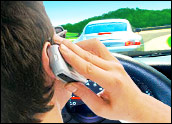
A team of scientists recently conducted a study of human travel patterns by secretly tracking the whereabouts of cell phone users.
Aiming to investigate the geographical patterns in which humans travel over time, the researchers studied the trajectory of 100,000 anonymized cell phone users — randomly selected from more than 6 million users — and tracked their locations over a six-month period via the calls and text messages they sent and received.
Also included for validation purposes were data that captured the location of 206 cell phone users every two hours for an entire week.
What the researchers found was that most individuals travel just short distances — only a few regularly move over hundreds of miles — and that we all follow a simple pattern. Humans also have a strong tendency to return to locations they have visited before, the authors found.
Entitled “Understanding Individual Human Mobility Patterns,” the study was published Thursday in the journal Nature.
Close to Home
“We found that human trajectories show a high degree of temporal and spatial regularity, each individual being characterized by a time-independent characteristic travel distance and a significant probability to return to a few highly frequented locations, like home and work,” said Albert-Lszl Barabsi, distinguished professor of physics and director of the Center for Complex Network Research (CCNR) at Northeastern University, who was lead author of the study.
Understanding the patterns in which humans travel has important implications for such applications as urban planning, traffic forecasting and predicting the spread of biological and mobile viruses, the authors said.
A previous study, published in 2006, approached the topic by analyzing the dispersal of about 500,000 dollar bills in the United States, using that data as an indicator of human movement. The new research, however, more closely reflects the movements of individual people, the authors noted.
“Contrary to bank notes, mobile phones are carried by the same individual during his/her daily routine, offering the best proxy to capture individual human trajectories, said Csar A. Hidalgo, Ph.D. and research assistant at the CCNR.
Privacy Implications
The cell phone users who were the unwitting subjects of the study were reportedly based in an undisclosed country other than the United States, and they were tracked through the participation of an unnamed carrier. Because they were unaware that they were being tracked, however, the new research has generated a wave of discussion about the privacy implications.
“One of the things the researchers stated was that the data was anonymized, and I don’t buy that,” Paul Stephens, a policy analyst with the Privacy Rights Clearinghouse, told TechNewsWorld. “If you are tracking the location of an individual with precision, then in many cases it is possible to ascertain who that individual is based on the location information.”
Ask First, Track Later
If someone is observed making a call in the evening from one address — presumably their home — for example, and then that information is put together with a call they make during the day, then “in the right hands, you could determine the identity of that individual,” Stephens explained.
A better approach from a privacy standpoint, he added, would be to first request users’ permission, and track only those who agree to participate.
“There are many people who would be willing to engage in this sort of tracking — with consent — but many would not,” Stephens said. “We need to respect the wishes of cell phone users in this regard.”
‘Privacy Is Dead’
Indeed, this study won’t be the last to raise such issues, wireless and telecom analyst Jeff Kagan told TechNewsWorld.
“The more technology is part of our lives, the more these kind of uses come up,” he said. “Who is tracking and why? And if they are tracking, do we know about it? These are all important questions.”
Anonymous tracking “is less of a problem,” Kagan conceded, but at the same time, “we all have to realize that privacy is dead and buried — it has been for a long time.”
‘We Can Only Imagine’
Cameras and electronics “track our moves every day,” and not all of them keep the data anonymous, he asserted. “Try to do something invisibly and you will realize you can’t.”
Such data can make “great articles for us to read and understand more about ourselves,” Kagan concluded, “but on the inside, we can only imagine how marketers and the government and others use this information.”






















































Track and Locate have developed a innovative " Man Down System" Mobile Phone Tracking application which works on NOKIA series 60 mobile phones. Life Assist application has capacity to save lone worker’s life, track employees, Kids Tracking (record driving speeds).
http://www.trackandlocate.net
http://www.trackandlocate.net/blog/